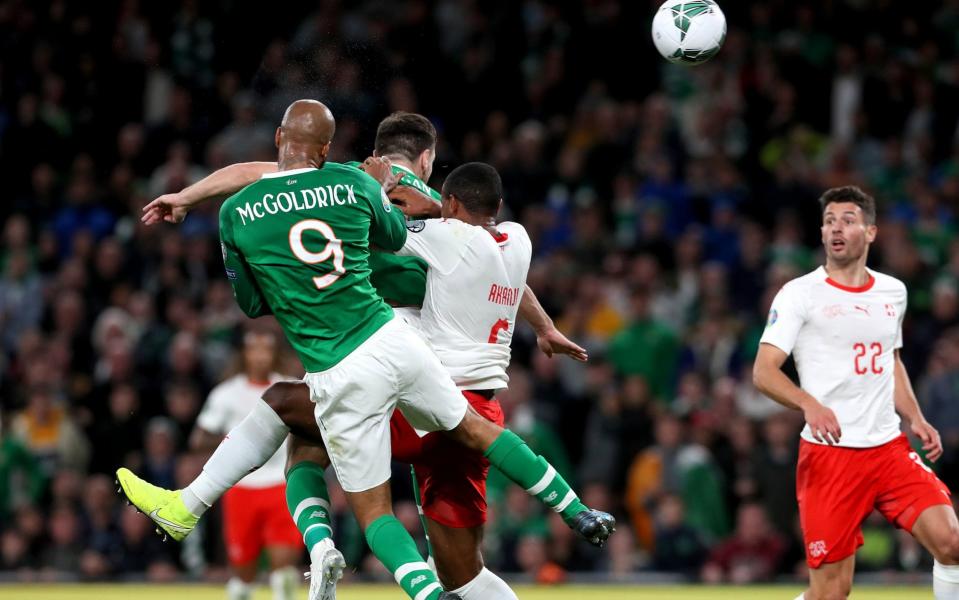Talks begin over all-island Irish football league: 'Football is the one sport that cuts across all class and cultural divides'

Every week, thousands of Irish football fans – most from Northern Ireland, but many from the Republic, too – travel to Great Britain to watch matches in the Premier League or Scottish Premiership.
Kieran Lucid, a tech millionaire from County Kerry, wants to harness some of this passion and turn it towards a new concept: an all-island Irish football league.
“Football is still the most popular sport in Ireland,” Lucid says. “So, why is the domestic product so poor?” His answer, essentially, is that both domestic leagues on the island – the League of Ireland Premier Division and Northern Ireland Premiership – have been poorly promoted and financed.
To try to rectify this, Lucid and members of the All-Island League Advocacy Group will hold a series of meetings with players, coaches, fans, administrators and broadcasters in Belfast, Dublin and Dundalk from Monday. These aim to win support to create a new league.
“It’s all about raising standards – it’s about getting the public interested,” says Lucid. “You have thousands going to Glasgow and some to Edinburgh every weekend for Scottish games – but they have 1.2 million fewer people than we do in Ireland. What are they doing that we can’t do? The key thing is to show our own game a bit of love, our own towns and cities a bit of love.”

Lucid would have no involvement in the league after its creation; it would be wholly owned by the clubs. The All-Island League Advocacy Group is not out for profit; Lucid will not make any money from the idea if it is voted through, save being reimbursed his costs.
“This is a passion project for me. People often say, why are you doing this? It’s very irrational to be spending all your time doing this. But football’s full of irrational people.”
The passions football inspires are one reason for the opposition to Lucid’s plans. The Irish Football Association initially rejected the plans for a complete merger of the two leagues – in general, fans have also been more sceptical in Northern Ireland so far – but will be present in the meetings this week.
After failing in October with attempts for a complete merger, Lucid enlisted Hypercube, a Dutch sports consultancy, to come up with a more palatable alternative. Various options are possible, with a split-season approach now being pushed. This model would entail the two leagues continuing in the first half of each year. In the second half, the 10 Northern Ireland sides and 12 Republic teams would join in some form of combined league, which would crown an all-island champion.
It would be a radical shift, yet in a sense would merely bring football in line with other sports on the island, such as rugby, Gaelic games, cricket and hockey, which are organised on an all-Ireland basis.
Naturally, the political climate adds extra intrigue. “Whatever happens with Brexit, we just have to get on with it,” says Lucid. But he contends that by working together across the Irish border, “football can lead politics rather than lag politics”, pointing out: “Football is the one sport on the island that cuts across all class and cultural divides. We all love this game and we want to see our clubs move from surviving to thriving.”

Lucid’s central idea is that the two Irish leagues punch way below their weight, while others from countries with a similar population and wealth – Scotland and Denmark – attract more fans, are far more lucrative and perform much better in Europe.
Last year, the Northern Ireland Premiership champions received less in prize money from the league than the £45,000 earned by the bottom club in Scottish League Two. Research by the football consultancy 21st Club finds that clubs from the Irish and Northern Irish top flights earn on average 89 per cent and 67 per cent less than could be predicted by the size and wealth of the nations’ economies.
A paucity of cash means that the standard of play in the two Irish top tiers is poor. Moldova, Armenia and Luxembourg are among the leagues which Uefa rate as stronger than the two Irish leagues, based on their performances in Europe. The average quality of matches in both Irish top-tier leagues is akin to games between leading teams in England’s National League North and South, according to 21st Club’s model. In a new cross-border Irish league, concentrating quality, the standard would rise to the lower half of League Two.
The real potential gains, though, would be if the new league raised substantial money. Discussions with broadcasters and sponsors, and Hypercube’s research, suggest that a full merged All-Island league could generate £5-8.5 million. This would be less using the split-season approach, but still a huge increase. More money, Lucid asserts, would allow teams to invest in better training facilities, retain their best players for longer and recruit better players.

“This has to happen,” says Lucid. “It’s more a question of when.”
He hopes that the league could launch in 2022. “Once the political will is there to do this, it could happen very quickly.”
While Uefa does not comment on hypothetical situations, it is known to be keen on exploring ideas that could help mid-sized leagues. Mergers “could be a strategic development in some European regions”, said a Uefa spokesperson.
The greater implications for European club football might be the most intriguing facet of the Irish plan. Globalisation has helped the clout of the big five leagues grow inexorably – combined, the big five now earn three times more than the top divisions in the other 50 Uefa members.
Schemes for merging leagues in smaller countries offer a counterpoint, however modest, to the big five; a potential way, at least, to stop the financial chasm becoming even greater still. The Baltic nations and even Belgium and Holland are other countries which have had discussions over either mergers or greater collaboration, such as transnational cup competitions. “In general,” says Omar Chaudhuri, the head of football intelligence at the 21st club., “We think cross-border leagues are the future for competitions outside the top five to seven major European countries.”
What plays out for Lucid’s plans this week, and the months to come, then, might not merely be an Irish question. It could also be a harbinger of what is to come in other European leagues in the years ahead.

